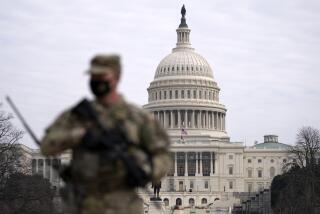Europeans Rebuff Reprisals on Libya : GOP Bill Would Broaden Reagan Attack Authority
- Share via
WASHINGTON — Republicans disclosed Friday that they are drafting legislation to give President Reagan full authority to use U.S. military forces to mount a global counterattack against terrorism for an unlimited period without seeking the approval of Congress.
The bill, to be introduced shortly by Senate Majority Leader Bob Dole of Kansas and a group of House Republicans, would exempt Reagan from any obligations under the War Powers Act if he decides to order a retaliatory strike against Libyan leader Moammar Kadafi. It is designed to capitalize on the current sentiment in Congress in favor of retaliation.
The War Powers Act requires a President to consult with Congress before committing U.S. forces to combat, to report to Congress within 48 hours after hostilities begin, and to obtain congressional approval if fighting continues beyond 60 days. But White House officials view the resolution as a vestige of the post-Vietnam era that does not apply in current situations.
Attack Criticized
Although the authors of the new bill do not believe a counterterrorist attack by U.S. forces comes under the War Powers Act, they acknowledge that some members of Congress would try to invoke the rule. In fact, some Democrats criticized Reagan last month for failing to abide by the law when U.S. warplanes damaged a Libyan SAM-5 missile base and destroyed two Libyan patrol boats in the Gulf of Sidra during U.S. naval exercises.
On Friday, Senate Foreign Relations Committee Chairman Richard G. Lugar (R-Ind.) complained in a letter to Secretary of State George P. Shultz that the Administration had not yet told Congress what kind of retaliation against Libya is being considered for last week’s bombing of a West Berlin discotheque that left one American dead and 64 injured.
But Lugar did not mention the War Powers Act because, as an aide said, “it raises a red flag with the Administration.”
Time for Resolution
“It’s time to get this issue resolved in law,” Dole said. “We’ve got to make sure the President has all the legal tools he needs to combat terrorism and the broadest possible political support for doing what has to be done.”
A co-sponsor, California Rep. Duncan L. Hunter (R-Coronado), added that the War Powers Act “wasn’t intended to keep the President from going into the Gulf of Sidra to wipe out a Libyan installation with a single missile.”
The legislation could gain support among Democrats as well as Republicans because many members of Congress have expressed support for retaliation against Kadafi. But it probably could not be passed quickly enough to relieve Reagan of the need to consult with Congress if he acts against Libya in the next few days.
Political Move Seen
Some Republicans dismissed the bill as an effort by Dole, who is a presidential aspirant, and other members of Congress to capitalize politically on a wave of anti-terrorist sentiment in the United States.
“They don’t want Ronald Reagan to get all the glory--that’s what this is all about,” said a Senate Republican aide, who declined to be identified by name.
But opponents of the legislation see it as an effort by Republicans to use the current concern about terrorism as an excuse to gut the War Powers Act and undermine the intent of the Constitution, which invested in Congress the right to declare war.
“It’s an outrage,” California Rep. Don Edwards (D-San Jose) said. “This is a constitutional right of the Congress put in there by our founders. Why don’t (the Republicans) just give all the power to the President and go home and play golf. The War Powers Act is too weak as it is. Going to war--that’s what we’re really talking about.”
Edwards Urges Defeat
Edwards predicted that the proposed measure would be defeated.
Even some opponents of the War Powers Act questioned whether the proposed new legislation should be introduced at this time. Lugar, who frequently serves as Reagan’s point man in Congress on foreign policy issues, is known to be against efforts to revise the law in what an aide described as “this charged atmosphere.”
At the same time, Lugar, who supports retaliation, argued in his letter to Shultz that the Administration must consult with Congress before taking any action so that a spirit of cooperation between the two branches of government is preserved.
No Talks Required
As currently drafted, the bill would not require the President to consult in advance with Congress before striking at terrorist groups. Nor would it require notification of Congress within 48 hours after a strike at terrorists, as does the War Powers Act.
Under the legislation, the President would be required to submit a report to Congress no later than 10 days after the initial strike against a terrorist target, explaining why he had acted.
The measure also broadly defines terrorism as an act of aggression against the United States. It asserts that the people behind the scenes are “just as much terrorists” as those who plant the bombs, and adds that the United States will do whatever is necessary to protect the lives of U.S. citizens.
Immediately after the exchange of fire with Libyan forces in the Gulf of Sidra last month, Rep. Dante B. Fascell (D-Fla.), chairman of the House Foreign Affairs Committee, criticized Reagan for failing to consult with Congress under the War Powers Act. Fascell’s view was supported at the time by Sen. Sam Nunn of Georgia, ranking Democrat on the Senate Armed Services Committee, who renewed his request for consultation Friday.
“The news stories sound like there’s someone in the White House saying we’re about ready to launch a strike,” said Nunn. “If that’s so, they have to do some sort of thinking about the War Powers Act.”
More to Read
Sign up for Essential California
The most important California stories and recommendations in your inbox every morning.
You may occasionally receive promotional content from the Los Angeles Times.













